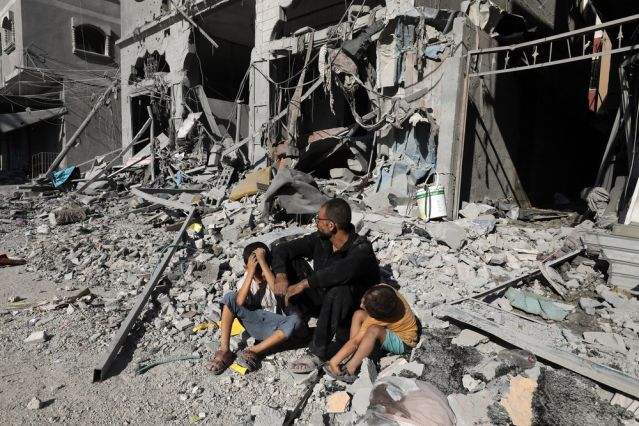Trauma
Childhood Destroyed: Children in the Israel-Hamas War
Children on both sides have paid a terrible price. But their experience differs.
Posted November 13, 2023 Reviewed by Devon Frye
Key points
- Children on both sides of the Israel-Hamas war have paid a terrible price with their bodies and minds.
- Many Israeli children can begin the process of healing. But in Gaza, healing must take a backseat to survival.
- Trauma and grief will be endemic among children on both sides. In Gaza, children also face severe deprivation.
- The trauma-related loss of faith in a just world presumes the world ever seemed just, unlikely for Gazan kids.

I have often wondered why so many humanitarian organizations prioritize children in their names. Why single out children, when war traumatizes women and men too, young and old; when it destroys entire families and drives communities into hiding, or across borders into the nowhere-land of refugee camps?
But lately, as I watch the ongoing horror of massive civilian deaths in Gaza, more than 10,000 as I write, following the gruesome and methodical slaughter of 1,200 Israelis and the abduction of 240 others by Hamas, I find myself thinking a lot about children. Specifically, I’m thinking a lot about Israeli children who survived the terrifying attacks by Hamas but witnessed the killing of their parents and other family members. And I’m thinking about Palestinian children in Gaza, who have also witnessed the killing of their parents and relatives, and for whom the ongoing threat of death by bombs or bullets, starvation, illness, or dehydration, makes every day a nightmare of fear and uncertainty.
I’m also thinking about the children on both sides of the war who did not, or have not, survived. Thirty-one Israeli children, and more than 4,000 Gazan children—more than three times the total number of Israelis killed by Hamas.
I’m thinking about the children on both sides of this terrible war, and the psychological price they will pay in the weeks and months and perhaps years to come. The journey of healing from trauma, moving through grief, and adjusting to life without loved ones killed in the war, will be extraordinarily difficult on both sides. But the pathways to healing will be different for Israeli and Gazan children.
In the interest of transparency, I speak as a Jew who lived on two kibbutzim as a young man, and as a psychologist who has worked in Gaza, as well as Afghanistan, Iraq, and Lebanon, and with Muslim refugees from Bosnia. My heart breaks for the children on both sides of this terrible war.
Israel remains under threat and Hamas rockets continue to land, but the all-out assault is over, for now at least. Many Israeli children have access to material and psychosocial support that can help them gradually recover, and in time, reassemble their lives. Their trauma and grief are profound and will take time and a great deal of support to overcome. Their sense of the world as a just place may be forever shattered, and they will grow up with a lived experience of vulnerability they may never outgrow. But for many, at least, the process of healing can begin.
Not so for children in Gaza. Their struggle now is simply to survive the air and ground attacks, as well as the hunger, thirst, and lack of medical care. If they survive the war, they will have the trauma that stems from prolonged exposure to terrifying violence, and the grief at everyone and everything they have lost. But they will likely not experience the loss of their belief in a just world, because that particular casualty of trauma assumes that survivors once believed the world to be a just place.
When I walked the streets of Gaza in 2016 and saw the poverty, smelled the putrid water, and heard the painful stories from my young colleagues of humiliation, deprivation, and restricted life choices, and when I watched children on the beach barely react to Israeli bombs exploding some distance away, I saw a world in which an assumption of the inherent fairness of life was simply implausible.
As a psychologist who has spent my career helping survivors of armed conflict heal from the wounds of war and overcome war’s destructive impact on the conditions of everyday life, I know only this: Children are paying a devastating price for a war carried out by adults who often seem remarkably unconcerned about the youngest causalities of their violence.
When the bombs finally stop falling, and the bullets are no longer being fired, and aid and the basic necessities of life are restored, then we will see clearly the destruction that has been wrought on the minds and bodies of children in Gaza, as we are now seeing it among children in Israel. Then, perhaps, the process of psychological healing can begin for all the children whose lives have been upended by this bloody war.


